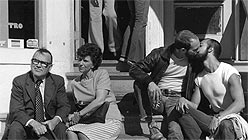I’ve been working on a story that brings back lots of memories, lots of thoughts, about a tough subject.
It’s a story about a documentary that PBS stations across the nation will air this week remembering the time of AIDS in San Francisco. Shown on the series Independent Lens, it’s called We Were Here, and it recalls in simple, straightforward interviews the lives of people living in the largely-gay Castro District. The area was a Mecca for thousands of young gay men who started arriving in San Francisco in the 1970s, and who began contracting AIDS — though they didn’t know what it was — towards the end of that decade and in the early ’80s. About 20,000 people died from AIDS in San Francisco alone; in California nearly 90,000 have died since the epidemic began. Today, many AIDS patients in America live a normal life, because of drugs developed as a result of the epidemic.
We Were Here tells the stories of four formerly young men and one woman — now middle aged — who lived through the horror of those years. Somehow, through luck or good genes or good medicine, they survived, but all of them lost friends and lovers, siblings and acquaintances. Their lives and the nature of the Castro district, and the power of the gay community, were changed forever.
But others, outside the community, like me, felt the devastation and the fascination as well, though perhaps not as directly or profoundly. As I talked with David Weissman, the film’s producer and director, I couldn’t help but remember some poignant scenes from those years:
I met Weissman on the corner of Castro and 18th Streets, where there used to be a gay bar called the Elephant Walk. In 1982, I covered a congressional campaign, where the legendary Democratic congressman Phil Burton was being challenged by a local Republican politician named Milton Marks. Marks was a glad-hander, a successful state legislator who loved meeting people. Trying to garner the votes of the gay community, whose political strength was just beginning to be felt partly over concern about AIDS, he plunged into the Elephant Walk. He was a fish out of water; he tried shaking hands with the bar’s patrons, but clearly, it didn’t quite work. Still, he forced a smile and played the room. He lost the election, and later switched his registration to Democrat.


